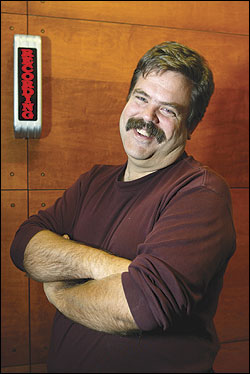When KING-FM’s Bob Goldfarb quit as program director last week and passed his baton to longtime staffer Bryan Lowe, the station’s innovative Internet guru, one embittered audience segment ululated with joy. Goldfarb’s two-year reign riled fans of hosts George Shangrow and Tom Dahlstrom, who were silenced after collectively contributing a third of a century’s worth of folksy local programming. And since Goldfarb’s resignation comes right after a steep downturn in ratings, the buzz in ancien-régime circles is that he got the boot himself, a just comeuppance.
“He resigned, he was not ousted,” says station General Manager Jennifer Ridewood. “Bob came to me about three weeks ago and told me he had some life personal things that were going to change this year, and he wanted to grow his consulting business.” Goldfarb is a nationally connected consultant who recently did a research paper for the National Endowment for the Arts on classical music and public radio, and he has tentative plans to leave town, though he vows to stay on as a KING consultant through this year’s contract.
Ridewood says there was indeed a “disappointing” ratings dip in the spring ratings book. KING-FM (98.1) had a 2 percent share of listeners over age 12, versus 2.6 percent last year. But the station’s ratings always dive in sunny months and rebound in the fall and winter. And Ridewood says that the yearlong average has remained steady at around a 3 share—down from the 4 share KING-FM scored in 1994, but approximately constant for the past four years. Industry buzz is that this summer’s numbers are worse, but Ridewood insists “the summer trends are up.”
What’s behind the decline in listeners? Seattle’s 2005 heist of San Diego’s weather patterns? An epidemic of TV news addiction? “Some people say it’s the weather, it’s the war—people go to news stations,” says Ridewood. In any case, the forecast for classical music is clouding up nationwide, as America declares war on culture and increasingly turns to talk radio.
“Music radio has been losing audience nationally for eight or nine years,” says research maven Goldfarb. “The only format with net growth is NPR, which is basically talk. The same sorts of people listen to NPR and stations like KING-FM, meaning that as NPR has grown, listeners have been gravitating away from classical music stations. But KING-FM’s listeners haven’t actually gone away; about the same number of people are listening, but for less time. Music radio has lost listeners to other delivery devices (such as iPods, streaming).”
I hope I haven’t personally helped drive listeners away—I’m part of Goldfarb’s talkification of KING-FM, doing 70-second movie reviews (an unpaid gig I enjoy but don’t fear losing). Some listeners tune in for KING-FM’s new news features from Seattle Weekly and The Seattle Times and BBC News.
But others just hate the new features that KING-FM fan Elly Welt calls “yakking.” She misses the old Shangrow/Dahlstrom days. “When George yaks, it’s genius! There’s a whole lot of pissed people with money, who will give a whole lot more money if they bring him back.” One source with inside information chalks up some of the ratings dip to “a lot of pissed-off core people. . . . Seattle’s unique—it’s not Boston, not Atlanta, not East Coast. It’s more relaxed and cottons to a more laid-back presentation. It’s kinda formatted-up now.”
Ridewood and Goldfarb point out one imminent change unlikely to be controversial: KING-FM commercial breaks are about to get shorter, from two breaks per hour to three, totaling the same 11 minutes. “That’s one of the lowest in radio in the city,” notes Ridewood.








